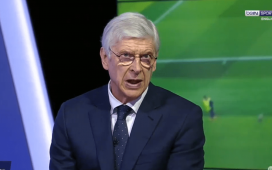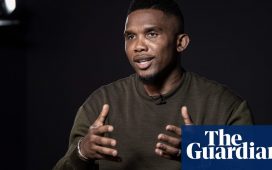It’s June 2014, and James Howarth is in a waiting room at Orpington hospital. A few weeks earlier, he’d been in to see the doctor about his acid indigestion. Too much beer and curry, he reckoned. But there was something there, a growth, on his pancreas. Now he’s waiting for a Cat scan. He gets talking to another patient, a cockney, Paul, who says to him: “So what cancer you got, son?” and James says back: “No, not me, mate – they’re just eliminating things. It’s a cyst, a growth, a mass.” Paul blinks and looks at him. “Don’t be so fucking naive mate, this is a cancer ward.” And James sits there blank, and his mind fills with fear “like a lock as the gates are opened”.
“Could be worse mate, you could support West Ham,” Paul tells him, “you don’t, do you?”
I met James outside Yokohama International Stadium, a couple of hours before Wales’s Rugby World Cup semi-final against South Africa. I was doing vox pops about England’s win in the other semi, and he and his mate Nigel were wearing white tops. We spoke about how happy they were – “best day of our lives” they said, “we All-Blacked the All Blacks” – and how they’d consoled the Kiwi couple who’d been sitting next to them: “Now you know how we feel.” And then, as I was breaking away, James told me: “You know we’re calling this the death’s door tour because I was given six months to live.”
I was still thinking about him when I got back home. So I found him, and phoned him.
Paul the cockney was right. James has lymphoma. When they first diagnosed it, the consultant told him: “For the next six months, you have a new job, and that job is to fight cancer and fight for your life.”
And James thought about his wife, and he thought about his three children, and he thought about his parents, he thought about all the big things we should be thinking about while we’re worrying about the little things we do think about. He thought about what he’d done, and what he wanted to do, and what he wanted to do was this: watch England win the Rugby World Cup, at home, in 2015. “I guess people deal with things in different ways,” he says, “someone who’s more sane than I am, more well-adjusted, might have goals to watch their children get married, but my kids are all so young, and I needed something much more short-term, and that’s what it was.”

Once, James had been a rugby player himself, “at a decent standard”. Then he’d become a PE teacher, at some hard schools, in Tottenham, in Canning Town, in Peckham, and, in the end, he became the head at the Hathaway Academy in Grays, Essex. “If I had a talent, it was to be able to relate to the most challenging children through sport,” he says. “My whole life has been built around sport and education, my friends are PE teachers, my wife is a PE teacher, I hired her when I was head of department, so our lives are totally entwined with sport.” James did better than England in 2015. He made it to the final.
And then he started to think about what was next. For four years, James’s life, like those of so many of the other 363,000 people who are diagnosed with cancer in the UK each year, has been measured out in hospital visits. Some of them lasted hours. Some lasted weeks. He’s been in remission, and been rediagnosed, been in remission again, been rediagnosed again. On Facebook, you can watch the video of the last assembly James gave at Hathaway, when he finally quit teaching. He sounds urgent, almost angry. “Look at yourself, take action, do something,” he tells the children, “don’t end up running on the spot, don’t waste your time doing things that aren’t related to moving forwards.”
No one ever told him he was crazy to think he could get to Japan in 2019, crazy to think he might see England win there, though, goodness knows, they must have thought it. James has lost a kidney, lost feeling in his leg, been through rare surgery, and an experimental course of drugs. He knows he will die with his cancer. Nine years ago, my own mother did too. The last trip we took together was to Japan, for my brother’s wedding. Talking to him, I remember how hard it was for her in that wheelchair, which she resented just as much as he does. “It’s not who I am.”
“I think they know that I’m a belligerent bastard, and it wouldn’t matter what they told me,” James says. “My biggest worry was that England were going to lose to Tonga in the first group match, because I wasn’t getting there till the second week.”
But England kept winning. Tonga, USA, Argentina, Australia, New Zealand. And here’s the thing. When, in the end, they lost, that was OK. Because the more they won, the less winning mattered. “I saw four of the 10 best games of rugby I’ve ever seen,” he says, “I saw the Scotland v Japan game with my mum. Our relationship had been really strained, and for us to be able to bond over a game of rugby, to get to a place I never thought we’d get back to… well, sport brings people together, doesn’t it? And that World Cup helped me re-establish my relationship with my parents, it gave me time to drink and be stupid with my best mate, and I saw the final with my kids and my wife.”
When he got home, they told James the pain he’d been feeling in his spine was a fracture, caused by a new tumour pushing into the bone. “I’m already thinking about the Lions in 2021,” he says. I tell him I’ll see him there, outside Ellis Park. And I think that sport matters, and sport doesn’t matter at all, not in the ways we imagine.














